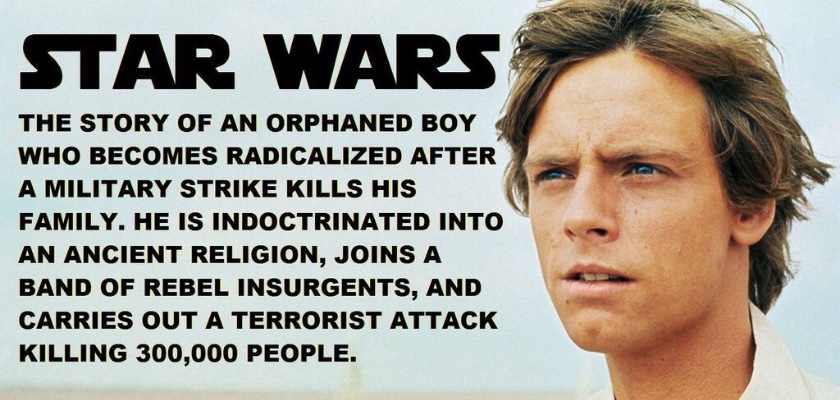
The Jedi Are Not the Good Guys
Consider it carefully as evidenced in "Episode IV: A New Hope" when Ben Kenobi says that "for a thousand generations the Jedi were the guardians of peace and justice in the galaxy." I submit that this is bullshit and here is why.
It turns out that by "Return of the Jedi," Kenobi admits to Luke that he lied to him about his father. "What I told you was true," the elder Jedi tells our hero. "From a certain point of view." This is cynical statement, made worse by the follow-up that truth is often in the eye of the beholder. Kenobi makes a political statement to justify his manipulation of Luke and get himself off the hook. It also begs the question if Kenobi all along had been watching Luke to recruit him as a Jedi. Since he admits that Luke was hidden away from Darth Vader and the Emperor, one must wonder he spent the next two decades "marooned" on Tatooine waiting for the boy to grow up and...await for revenge? The Jedi are not about revenge, but it's hard to figure out what other word fits, particularly when Kenobi laments to Yoda that Luke is their last hope. Last hope for what? To overthrow the Emperor? Defeat the Galactic Empire? How can there *not* be a political benefit to this?
Throughout episodes I through III, the Jedi don't exactly come across as particularly likeable. They are aloof and secretive, unaccountable to anyone (it's not clear how the Galactic Senate controls them if at all) and remain ensconced on the city planet of Coruscant in a temple. While Kenobi in his old age talks wistfully about the Force being an energy field created by all living things that binds the galaxy together, that does not seem to have always been the case. The Jedi are racialists, you see, looking for future recruits based on the count of microscopic organisms that actually comprise the Force. If one fits the criteria, as children no less, they are spirited away to become apprentices in the Jedi Temple, ostensibly never to see their families again.
A key element of their indoctrination, and one that provides the conflict with Anakin Skywalker, is complete detachment. They are reared and trained to be unemotional. This explains their indifference to suffering, such as the blasé attitude of Qui-Gon Jinn to the slave status of Anakin and his mother. He makes no attempt to save the latter, and is only interested in the former because of his "midichlorian" count, which is off the charts. By the time we get to Episode II and Annakin is a now a young adult, it becomes clear that he has a difficult time controlling his emotions, which partially explains his awkwardness around Padme. And he is constantly berated for it by his new master, Obi Wan.
Anakin was of interest to the Jedi because of their search for "the one who would bring balance to the Force." While this is never explained in detail, in training Jedi to be selfless, the baby has been thrown out with the bath water, because they also become indifferent. It's an interesting concept for a space western, and one that most people seemed to have ignored in the rush to complain about George Lucas' direction or Hayden Christiansen's acting. Anakin cannot fundamentally become unattached and indifferent, which sheds light on his obsessive concern for Padme, who is a stand-in for his failure to protect his mother. Likewise, Luke breaks with Obi Wan and Yoda in trying to save his friends, which Yoda had written off: "If you value what they suffer for, yes [you should abandon them to their fate]." Like his father, Luke cannot become unfeeling and watch blithely with his comrades' lives in danger. While Anakin could not control his emotions, Luke reigns his in and refuses to kill his father. Perhaps the "balance" the Jedi were looking should have been one between indifference and over emotionalism. If that's true, they they got their entire reading of the Force completely wrong to disastrous effect. Not only were they oblivious to the Dark Side's power and ability to hide in plain sight, they let Anakin slip through their fingers to become the Sith Lord par excellence, Darth Vader.
One has to wonder if the weakness of the Republic wasn't just a mirror for the weakness of the Jedi. Arrogant and complacent, they seem to hew to a gospel (of sorts) of cold diffidence while ostensibly upholding justice. The famous phrase "quis custodiet ipsos custodes" is most applicable to the Jedi. Not only did the Republic turn into an Empire, but it would take decades for a possible plan to strike back via a young man who was manipulated by the promise of being a Jedi in the tradition of his father: a man destroyed by the Jedi themselves and would become an agent of evil. Perhaps they were not the unblemished good guys we all thought them to be.